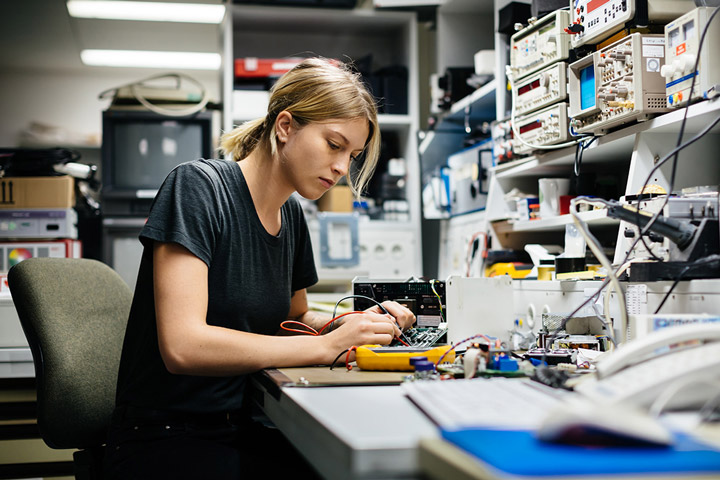- Go to homepage
- Course areas
- Electrotechnology
- Certificate III in Electronics and Communications

OverviewAbout this course
Step into the exciting and varied world of electronics as you learn a range of technical repair and maintenance skills. Be prepared for a career as an electronics technician or tradesperson.
OutcomesWhat you'll gain
Learning outcomes
Through a mixture of theory and practical course work, learn to:
Fabricate, assemble and dismantle electrical equipment and devices
Solve technical issues in analogue and digital electronic and communications circuits and systems
Use industry-relevant computer applications
Implement safe work practices and regulations
Course outcomes
Gain practical experience and develop specialist skills that give you an advantage in the job market.
Experience in applying key electronic principles to a range of real world industry challenges
The skills to build and test electronic circuits using different electronics components and devices
Techniques to install, set-up, test, repair and maintain electronic equipment and devices at a component/sub-assembly level
A sound understanding of environmentally-minded electronic practices and procedures
Strong pathways to continue your studies and enhance your career opportunities
SuitabilityIs this course right for you?
Entry requirements
This course requires evidence of previous experience or study before you can enrol
Apprenticeship
Be employed as an apprentice in the industry
Register with an Apprenticeship Connect Australia Provider (ACAP) who will support your application
Non-apprenticeship
Non-apprenticeship pathways for trade-related qualifications allow you to have your industry skills assessed through recognition of prior learning (RPL) and undertake gap training to gain a trade qualification. To take this course as a non-apprenticeship, you must:
Be at least 21 years of age, as evidenced by photo identification
Have at least 2 years of work experience in this occupation or trade, as evidenced by employee records such as your resume and/or letters from your employers
Be currently employed in the relevant industry, as evidenced by a letter from your employer
Completion requirements
During your study you’ll need to provide your teacher with the following evidence:
Entry recommendations
To be prepared for this course, we recommend that you have:
A talent for technical work
The ability to follow verbal and written instructions
Good hand-eye coordination
Language, Literacy and Numeracy (LLN) at a Year 10 high school level
To set you up for study success and ensure your skills match the demands of your course, TAFE NSW offers you a free Language, Literacy and Numeracy (LLN) assessment. This assessment helps us to work with you to understand your individual study needs, to direct you to the right course for you and to give you the personalised support you need to succeed.
If you need help preparing for study, contact us about your options.
TAFE NSW is committed to meeting the learning needs of every community. Meeting these needs can mean there are additional entry requirements at different campus locations. Check your preferred location for further requirements. If you need help preparing for study, contact us to find out how we can support you.
PathwaysFuture career and study options
Career pathways
Our graduates go onto roles like: electronics tradesperson or technician, electronics equipment service technician, electronics equipment installer and audio visual installer.
Study pathways
Take your study further with other courses offered at TAFE NSW:
Previous study1 Course
Begin here to gain experience and confidence in this study area.
Further study0 Courses
Advance your skills to take your career to the next level
The Certificate III in Electronics and Communications does not have any post-graduate courses.
Related study1 Course
Strengthen your expertise and gain specialist skills to expand your employability.
Your experience counts
At TAFE NSW, we recognise your previous study and work experience. You can apply for recognition of prior learning or a credit transfer with any of our courses. If you're successful you'll get your qualification faster.
UnitsUnits taught in this course
Courses are made up of a combination of both core and specialty units. In the Certificate III in Electronics and Communications qualification, you’ll need to successfully complete 1060 weighting points, including 680 core and 380 speciality units.
Please note, not all specialty units are offered at every TAFE NSW location. It is highly recommended that you check with your preferred campus for information about the specialty units offered at that location.
Core units are central to the job outcomes of a particular industry or occupation. These are the units industry has agreed are essential to be capable and qualified at a particular study level.
Fault find and repair complex power suppliesUEEEC0028
Apply environmentally and sustainable procedures in the energy sectorUEERE0001
Document and apply measures to control WHS risks associated with electrotechnology workUEECD0016
Participate in electronics and communications work and competency development activitiesUEECO0007
- ... 4
TAFE NSW servicesFacilities and support
TAFE NSW provides support services across all campus locations and online. Whatever your needs or circumstances, we have the people, resources, counselling and facilities to support you in focusing on your studies.
TAFE NSW Disability Support Service
TAFE NSW Language, Literacy and Numeracy (LLN) support
TAFE NSW Aboriginal Support; Learner support (ABE)
TAFE NSW Careers, Counselling and Pathways Service
TAFE NSW Libraries
Scholarship programs – be supported as you explore your talents and fulfil your potential
Read&Write literacy and study support software is available free for all TAFE NSW students to use while studying on campus and at home
LinkedIn Learning – an online resource which offers innovative courses and tutorials to improve your personal and professional skills
Student associations – get social with our student community